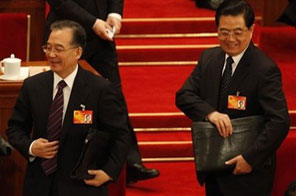China looks to narrow city-rural development gap
BEIJING: China is boosting representation for its dwindling rural population in the national legislature as part of a new push to narrow the development gap between city and countryside.
Once an overwhelmingly rural society, China is urbanizing at an accelerating rate, with 43 percent, or 560 million people, now living in the cities, according to official figures. The urban population has risen 7 percent in the last five years.
There are nearly 3,000 members of the legislature, known as the National People's Congress, but members from urban areas represent just one quarter the number of constituents as their rural counterparts. That was originally intended as a way of protecting the interests of what had been a small urban minority surrounded by hundreds of millions of farmers.
An amendment to the election law erasing that distinction will be passed before the close of the annual session of the National People's Congress on Sunday.
"This change helps fill the need for equal development rights," Miao Zhi, a delegate from the western, largely rural, region of Xinjiang, said Monday. "It's a step forward for the human rights cause."
The change is hardly a step toward open elections: National People's Congress delegates will still be chosen by assemblies at the provincial level, who in turn are picked by congresses at the city, county, township, and village levels. Communist Party officials preselect many candidates, especially at the higher levels.
However, the reform move is in keeping with President Hu Jintao's pledges to improve conditions for the bulk of the population getting by on the average rural per-capita annual disposable income of 5,153 yuan (about $750) — or in some areas, much less.
Like many large developing nations, China's city-countryside divide is vast, with rural residents earning incomes that are on average just one-third of urban ones. Schools, hospitals, recreational facilities and government services lag far behind those in the cities.
While rural residents have been migrating in increasing numbers, they are excluded from subsidized housing and other benefits by their official residency status, or "hukou." The system, which designates each citizen as either rural or urban, has been likened by some to a form of apartheid that enforces the gap in income and benefits.
Coveted urban status can be obtained, but only under certain conditions, such as investing in property or by marrying a city dweller.
The system was originally designed to control internal migration and ration resources as part of strict social controls under Mao Zedong's communists, who seized power in 1949.
Critics say it is outdated and out of step with the increasingly mobile, cosmopolitan society. In a sign of mounting dissatisfaction, 13 newspapers across the country published a joint editorial last week calling for it to be scrapped.
"Freedom of movement is a human right," the editorial said.
Officials say they are moving to reform the system, but haven't indicated they will end it entirely.
Zhang Zuoha, vice governor of Sichuan in the country's southwest, said his province had eliminated some hukou requirements and expected other regions to accommodate the 20 million Sichuanese who migrate in search of work.
"For those who have relatively stable jobs and housing, the place where they live must accept them and deal with their hukou issue," Zhang said.






